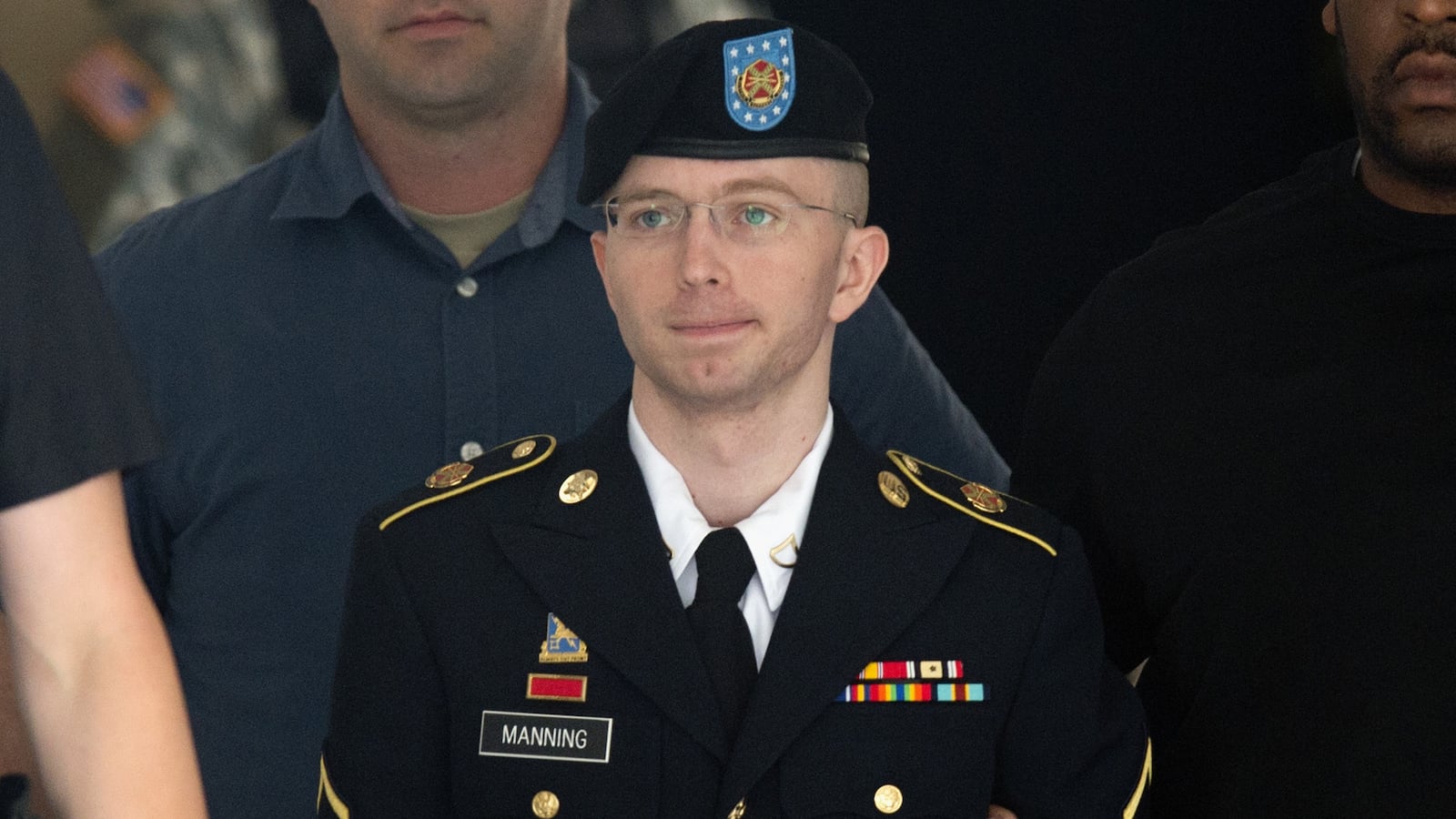The dramatic trial of Bradley Manning culminated Tuesday with a brutal verdict that could silence potential whistleblowers willing to expose the clandestine practices of the U.S. government.
In pronouncing Manning guilty on 20 counts, military judge Denise Lind rubber-stamped the Obama administration’s obsession with seeking to imprison those who leak government secrets. A sentencing hearing began today with Manning facing up to 136 years in a military prison.

The judge did refuse to convict Manning of “aiding the enemy,” the harshest charge he faced. Daniel Ellsberg, who leaked the Pentagon papers in 1971, said that precedent would have curbed virtually all sources of investigative reporting. “American democracy just dodged a bullet,” he said.
After finding Manning guilty of six counts of spying under the Espionage Act, however, America may be playing Russian roulette.
At the culmination of a contentious trial that asked how hundreds of thousands of diplomatic cables and U.S. Army reports came to be published by WikiLeaks in 2010, there was also a glimmer of hope for the defense team, as legal observers questioned the thinking behind some of the judge’s rulings.
Col. Denise Lind, presiding over the trial, found Pfc. Bradley Manning guilty of 20 offenses under the Uniform Code of Military Justice including the theft of five U.S. government databases, six violations of the Espionage Act, and one violation of the Computer Fraud and Abuse Act.
Amid 20 guilty verdicts, Lind found Manning not guilty on one crucial charge. The trial had raised fears from a generally absent press over the potential threat to the First Amendment and national-security reporting, if Lind convicted Manning of aiding the enemy. Prosecutors argued that Manning had indirectly given intelligence to al Qaeda, an offense for which he could have spent his life in a military prison without the chance of parole. During powerful testimony in the Fort Meade courtroom recently, Prof. Yochai Benkler, co-director of the Berkman Center for Internet and Society at Harvard Law School, explained that the cost of finding Manning guilty of aiding the enemy, simply by disclosing sensitive information to the public, would impose too great a burden on the “willingness of people of good conscience” to come forward and “would severely undermine the way in which leak-based investigative journalism has worked in the tradition of [the] free press in the United States.”
For a soldier facing 136 years in prison, the impact of that not-guilty ruling may be negligible. Manning was, after all, found guilty of six offenses under the Espionage Act, which each carry a maximum sentence of 10 years in jail. He was convicted of disclosing a selection of U.S. Army reports from the Afghanistan and Iraq wars, as well as five Guantánamo detainee assessment briefs, and U.S. Army investigative documents related to a U.S. bombing in May 2009, which were found on Manning's work computer alongside images of burn victims.
A health worker who had witnessed that bombing, which killed at least 147 women and children in the Farah province of Afghanistan, said, "Words cannot describe how terrible it was."
Manning's trial has extended the unmatched streak of prosecutions by the Obama administration of unauthorized disclosures to the press using a 1917 statute that was originally intended for spies. The Department of Justice argues that leaks to the press are a "greater threat to society" than spies selling classified information to a foreign government, because "every foreign adversary stands to benefit," according to documents in the espionage prosecution of Jeffrey Sterling, a former CIA employee accused of leaking classified information to a reporter at The New York Times.
A number of Lind's decisions appear to open the door for defense on an imminent appeal. If Manning is sentenced to more than one year of confinement or punitively discharged, his case is immediately appealed to the Army Court of Criminal Appeals, where Lind was recently promoted. Legal experts I spoke with are eager to read Lind's detailed findings (expected in the coming weeks) to try to understand how she could have reached the decision that the information released by Manning related to national defense. The charged documents did invite potential embarrassment. A confidential CIA report was titled “Afghanistan: Sustaining West European Support for the NATO-led Mission—Why Counting on Apathy Might Not Be Enough,” and another secret CIA report was titled “What If Foreigners See the United States as an 'Exporter of Terrorism'?”
To have proven Manning's guilt under the Espionage Act, the prosecution also had to show that the information was "closely held." Surprisingly, Lind found him guilty of the disclosure of the Army Counterintelligence Center's report titled “Wikileaks.org: An Online Reference to Foreign Intelligence Services, Insurgents, or Terrorist Groups?" despite that the report was based primarily on public reporting.
Although Lind found Manning not guilty for the unauthorized disclosure of an unclassified video of the 2009 bombing, which connected the Manning prosecution to an ongoing federal criminal investigation of Julian Assange and WikiLeaks, she did find him guilty of “wanton publication of intelligence on the Internet,” which suggests prosecutors convinced her that WikiLeaks was not a legitimate journalistic organization.
Wanton publication has never been used in military law and is not tied to an existing federal criminal violation or punitive article of the Uniform Code of Military Justice. Manning's defense had called the charge a "made up offense." While “wanton publication” does not mean Manning has to be publisher himself, prosecutors argued that Manning indiscriminately harvested information for Julian Assange and WikiLeaks and participated in editing a video of a July 2007 U.S. Baghdad airstrike that killed at least 12 civilians, including 2 Reuters employees, and injured 2 children.
Lind ruled that evidence that al Qaeda had obtained information via WikiLeaks was also relevant to proving “wanton publication.” The offense is intended to proscribe the unauthorized disclosures of large data sets by individuals and publishers empowered by the Internet's low cost and accessible means of distribution. The former assistant secretary of public affairs at the Department of State, Philip J. Crowley, called Manning's leaks "industrial scale." Benkler, a defense expert witness, testified, however, that Manning's leaks were proportional to the Information Age he lives in.
Manning was also found guilty of five thefts of government databases.
In a recent controversial legal maneuver, military prosecutors conceded after the close of evidence at trial that Manning did not steal the entire database as originally alleged in three cases: the CIDNE-Iraq (Iraq War logs), the CIDNE-Afghanistan (Afghan War diary) databases, and the US Forces-Iraq Microsoft Outlook global address list.
The defense had sought to dismiss the five theft charges, arguing that the prosecution had not presented any evidence at trial that Manning stole the databases. If military prosecutors had intended to use evidence for the theft of information, said the defense, they should have charged Manning accordingly. The court recently ruled the databases were equivalent to the records and the information contained within them. Lind also ruled that military prosecutors could change the charge sheet last Wednesday after the defense and the prosecution had rested their cases—19 months into the proceedings. Lawyers for the defense responded that they should not be penalized for being aware of federal case law" and that Lind’s rulings unfairly prejudiced Manning. The issue is likely to be brought up on appeal.
Unlike a federal criminal trial, sentencing phase can begin immediately.
The defense and the prosecution will present evidence, call witnesses, and make arguments about appropriate punishment.
Since the court ruled that motive and actual damage (or “lack of damage") evidence was not relevant at trial, evidence of Manning's intent and the impact of the leaks will finally be heard by the court during the sentencing hearing, which began Wednesday. It remains to be seen, however, how much of the sentencing phase of this trial will be open to the public, since the government is expected to elicit testimony from 13 classified sentencing witnesses in closed sessions or in classified stipulations for their sentencing case. Three classified damage assessments would be used as evidence at sentencing.






